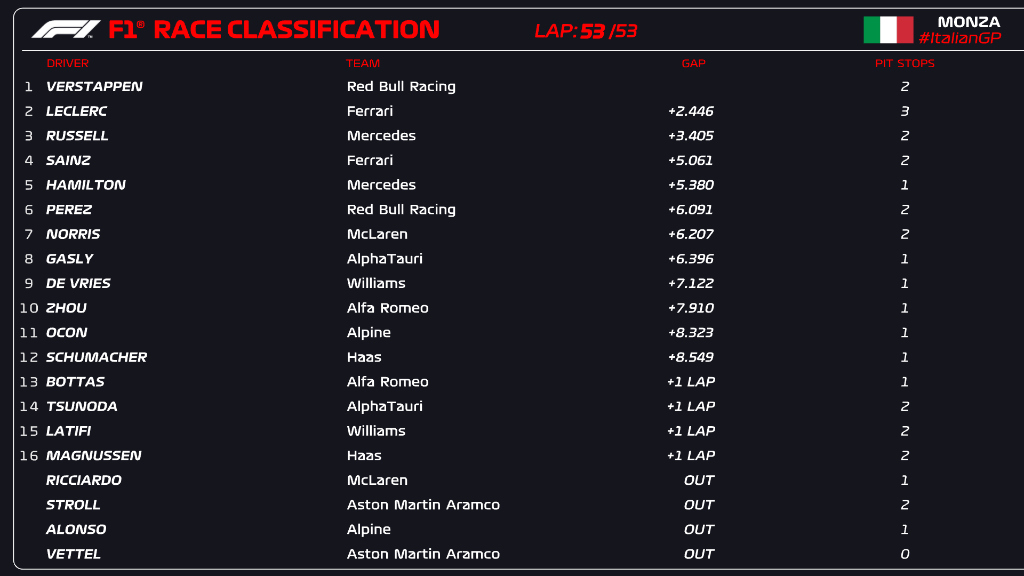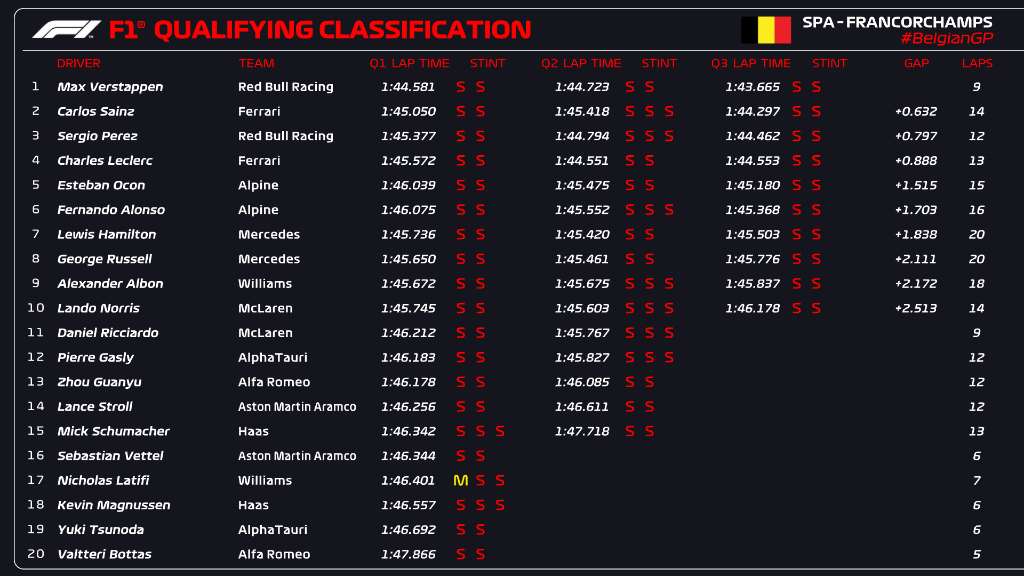Welcome to the world of F1 results! If you're a motorsport enthusiast or just someone who loves high-speed racing, you've come to the right place. Formula 1, often called the pinnacle of motorsport, offers more than just thrilling races—it's a blend of strategy, engineering, and raw talent. In this article, we'll dive deep into everything you need to know about F1 results, from how they're calculated to their significance in the sport.
Now, you might be wondering, why should I care about F1 results? Well, understanding the outcomes of these races isn't just about knowing who won. It's about appreciating the intricate details that go into making a driver victorious. From qualifying sessions to race day strategies, every decision impacts the final standings.
So, buckle up because we're about to take you on a journey through the exciting world of Formula 1 results. Whether you're a seasoned fan or a newcomer, there's something here for everyone. Let's get started!
Read also:Cctv Idiots Twitter
What Are F1 Results and Why Do They Matter?
F1 results, simply put, are the official outcomes of Formula 1 races. But they're more than just numbers on a leaderboard. These results shape the narrative of the season, influence driver standings, and even affect team dynamics. For fans, understanding F1 results is key to truly enjoying the sport.
Imagine this: You're watching a race, and your favorite driver crosses the finish line in first place. That's great, right? But what happens next? How does that victory translate into points? And how do those points affect the overall championship? These are the questions that F1 results help answer.
How Are F1 Results Calculated?
The calculation of F1 results is a fascinating process. Drivers earn points based on their finishing positions, with the winner receiving 25 points. The points system continues down the leaderboard, with the 10th place driver earning 1 point. It's a straightforward system, but there are nuances.
For instance, if a race is stopped and restarted, the points distribution might change. Additionally, there are bonus points for achieving the fastest lap, which adds an extra layer of strategy for teams and drivers. Here's a quick breakdown:
- 1st Place: 25 points
- 2nd Place: 18 points
- 3rd Place: 15 points
- Fastest Lap: 1 extra point
The Importance of Qualifying in F1 Results
Qualifying plays a crucial role in determining F1 results. It's the session where drivers compete to set the fastest lap times and secure their starting positions on the grid. A good qualifying performance can set the tone for a successful race day.
Think about it: Starting from pole position gives a driver a significant advantage. They have clean air ahead of them, which means less turbulence and better aerodynamics. Conversely, a poor qualifying result can make it challenging to claw back positions during the race.
Read also:La Mona Erome
Impact of Weather on F1 Results
Weather conditions can drastically affect F1 results. Rain, for example, can turn a race on its head. Drivers need to adapt their strategies, choosing the right tires and adjusting their driving styles. Teams that can predict and respond to weather changes effectively often come out on top.
Take the 2021 Belgian Grand Prix, for instance. Heavy rain led to the race being called off after just a few laps, with points awarded based on qualifying positions. Situations like this highlight how unpredictable F1 can be and how crucial it is to stay adaptable.
Driver Standings and Their Connection to F1 Results
Driver standings are directly influenced by F1 results. Each race contributes to a driver's total points tally, which ultimately determines their position in the championship. Consistent performances throughout the season are key to securing a title.
But it's not just about winning races. Drivers who consistently finish in the top 10 can accumulate enough points to challenge for the championship. This is where strategy comes into play. Teams need to decide whether to go for a win or play it safe and secure valuable points.
Team Strategies and Their Role in F1 Results
Team strategies are another critical factor in F1 results. From pit stops to tire choices, every decision can impact the outcome of a race. Teams work tirelessly to analyze data and make the best possible decisions for their drivers.
For example, a well-timed pit stop can put a driver in a perfect position to overtake competitors. Conversely, a delayed stop might cost them valuable time. It's all about timing and precision, and the best teams excel at both.
The Role of Constructors' Championship in F1 Results
While much of the focus is on drivers, the constructors' championship is equally important. This competition ranks teams based on the combined points of their two drivers. It's a testament to a team's overall performance and engineering prowess.
Winning the constructors' championship requires more than just having a fast car. It demands consistency across both drivers and the ability to adapt to different circuits and conditions. Teams that achieve this balance are often the ones celebrating at the end of the season.
Technological Advancements and Their Impact on F1 Results
Technology plays a massive role in shaping F1 results. From aerodynamic innovations to advanced telemetry systems, teams are constantly pushing the boundaries of what's possible. These advancements not only make the cars faster but also provide teams with valuable data to refine their strategies.
For example, the introduction of hybrid power units in 2014 revolutionized the sport. Teams had to adapt to new regulations, and those that did so successfully reaped the rewards. It's a reminder that in F1, staying ahead of the curve is essential.
Historical Insights into F1 Results
Looking back at the history of F1 results reveals some fascinating trends. Certain drivers and teams have consistently dominated the sport, setting records that may never be broken. Names like Michael Schumacher, Lewis Hamilton, and Ferrari resonate through the annals of motorsport history.
But it's not just about the big names. There are countless stories of underdog victories and unexpected twists. These moments are what make F1 so captivating. They remind us that anything can happen on race day, no matter how predictable things might seem beforehand.
Key Moments That Shaped F1 Results
Some races stand out in F1 history for their dramatic outcomes. The 1984 Monaco Grand Prix, for instance, saw a young Ayrton Senna battling against the rain to finish second behind Alain Prost. It was a race that showcased Senna's incredible talent and marked the beginning of his legendary career.
Then there's the 2008 Brazilian Grand Prix, where Lewis Hamilton secured the championship by finishing fifth in a rain-soaked race. These moments highlight the unpredictability of F1 and the importance of perseverance and strategy.
Future Trends in F1 Results
As Formula 1 continues to evolve, so too will the factors influencing F1 results. Sustainability is becoming a major focus, with the sport aiming to reduce its carbon footprint. This could lead to new regulations and technological innovations that reshape how races are won.
Additionally, the expansion of the calendar to new and diverse locations means teams will face a wider variety of challenges. Adapting to these changes will be crucial for success in the coming years. It's an exciting time for F1 fans, with plenty of developments on the horizon.
Predicting the Next Big Shift in F1 Results
While predicting the future is always tricky, one thing is certain: F1 will continue to push the boundaries of what's possible. Whether it's through advancements in technology, changes in regulations, or shifts in team dynamics, the sport will always find ways to keep fans engaged.
So, what does this mean for F1 results? It means that every race will be filled with new surprises and challenges. Drivers and teams will need to be more adaptable than ever, ready to seize opportunities as they arise.
Conclusion: Why F1 Results Matter
In conclusion, F1 results are more than just numbers. They tell the story of each race, highlighting the triumphs and challenges faced by drivers and teams. Understanding these results allows fans to appreciate the complexity and excitement of Formula 1.
We encourage you to dive deeper into the world of F1 results. Follow the races, analyze the data, and discover the strategies that lead to victory. And don't forget to share your thoughts in the comments below. Who knows? You might just uncover the next big trend in the sport!
Table of Contents
- What Are F1 Results and Why Do They Matter?
- How Are F1 Results Calculated?
- The Importance of Qualifying in F1 Results
- Impact of Weather on F1 Results
- Driver Standings and Their Connection to F1 Results
- Team Strategies and Their Role in F1 Results
- The Role of Constructors' Championship in F1 Results
- Technological Advancements and Their Impact on F1 Results
- Historical Insights into F1 Results
- Future Trends in F1 Results


